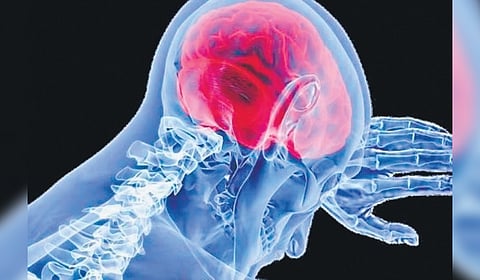

KOCHI: As many as five children of the age group five to seven of St. Paul's International School, Kalamassery, have been admitted to various private hospitals in Kochi following symptoms of meningitis on Tuesday.
The condition of the students remains stable. However, two of them are admitted to ICU. Following the incident, the Ernakulam district medical officer, Dr Asha Devi, has ordered the school to be closed.
According to the World Health Organisation (WHO), meningitis is the inflammation of the tissues surrounding the brain and spinal cord. It is usually caused by infection—bacteria, viruses, fungi, etc.
According to Dr Rajeev Jayadevan, convenor of the Indian Medical Association Research Cell, this is a less severe form of meningitis.
"Meningitis is inflammation of only the covering of the brain, not specifically of the brain," adding that many things can cause meningitis.
Among them, the least serious are viruses like enterovirus, which cause the most cases of viral meningitis. "There are some other viruses, including mumps, chickenpox virus, etc," he added. Bacterial meningitis, on the other hand, is more severe.
Among them, the least serious are viruses like enterovirus, which cause the most cases of viral meningitis. "There are some other viruses, including mumps, chickenpox virus, etc," he added.
"Although meningitis affects all ages, young children are most at risk," stated WHO.
In the case of viral meningitis, the patient commonly recovers with only supportive treatment. "Bacterial meningitis requires courses of antibiotics. However, most cases of viral meningitis do not require such medicines. Sometimes antivirals are used depending on which virus it is," said Dr Rajeev.
These viruses can spread from person to person. "As the children are from the same school, the infection may have spread from one child to another," he added.
Meanwhile, the health department has sent the sample for further tests at the Institute of Virology, Alappuzha, and the results are expected to be on Wednesday evening.
Prevention
Do not send the child to school if there is a fever. This reduces the chance of spread.
Frequent hand-washing with soap and water
Avoid sharing personal utensils like water bottles in class.
Cough etiquette: cover the mouth while coughing or sneezing, this reduces the spread.
Cleaning of frequently touched/contaminated surfaces.
Food and water safety.
According to the World Health Organisation, vaccines can prevent specific types of meningitis. Vaccines are available against meningococcus, pneumococcus, Haemophilus influenzae type b (Hib). In addition, MMR (Mumps virus can cause meningitis) and Chicken pox vaccine (this virus can rarely cause meningitis) are also helpful.